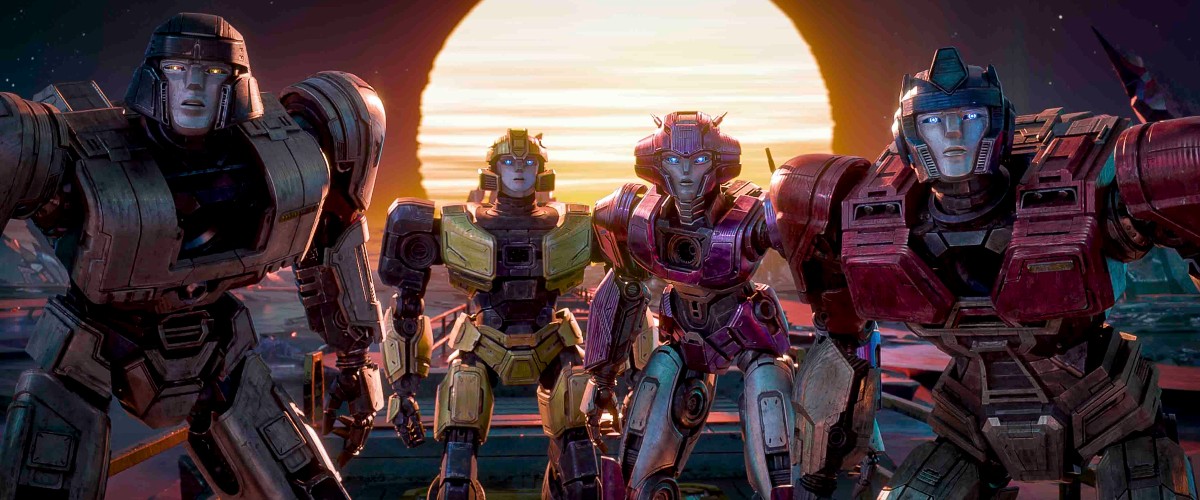Just when you’re ready to give up on stories that repackage the same trademarks over and over again, a film like Josh Cooley’s Transformers One comes along. As its subtly self-aware title suggests, it comes across as if no one has ever made a Transformers film before. It’s so sincere, and it brings a sense of freshness and innocence to a prequel that really shouldn’t have had one.
Cooley pulled off the unlikely feat of saying new things about very well-known characters from the series in Toy Story 4. He does the same here, inventing an elaborate backstory for characters who, despite their considerable appeal, were never known for strong historical awareness and psychological depth. It’s fun to imagine an alternate universe where no one knows anything about these characters, let alone that there will eventually be a galaxy-spanning war between the Decepticons and the Autobots. That way, people might be shocked and moved to see the main characters become the robot equivalent of brothers facing off on a battlefield during a civil war. The effect would probably be similar to watching the Star Wars prequels without knowing that best friends Obi-Wan Kenobi and Anakin Skywalker end up on opposite sides of the Force.
Of course, the characters alluded to here are Optimus Prime and Megatron. They’re introduced as two lonely nobodies named Orion Pax (voice: Chris Hemsworth) and D-16 (voice: Brian Tyree Henry). Orion Pax and D-16 work as miners on Cybertron, a planet of intelligent robots divided into two social classes: those with transformation gears (or T-gears) and those without. Those without are essentially slaves mining Energon, the fuel/food that keeps the robots running. All of this mining is because the planet has lost the fabled Matrix of Leadership. Orion Pax is convinced that if he and his buddy D-16 can recover it, it will not only eliminate the need for slave labor, but also allow the oppressed underclass to rise up and become something other than second-class citizens.
What the hell? asks the reader. Has Josh Cooley twisted the “Transformers” into a parable that lies somewhere between a film about slave revolts and a metaphor for labor versus management? Actually, yes. Of course, you can’t get very far with a story like that without incurring the wrath of the megacorporation that pays the bills (in this case, Paramount, which, at the time of this writing, is on track to become a wholly owned subsidiary of tech mogul David Ellison’s Skydance Media). And there’s a hint of monarchist fetishism mixed in at the end, just because the guys are looking for a mythical artifact that grants superpowers rather than, say, writing a constitution and forming a parliament. Not that anyone would be interested in a movie with that plot—Transformers fans have been engrossed in a mythological “find the artifact and embrace your cosmic destiny”-flavored story for decades, and they’re here to see robots beat the shit out of each other and turn into cars and airplanes and so on—and after a brisk but dense buildup, the film finally gets there, staging a large-scale battle in the spirit of a Star Wars or Guardians of the Galaxy movie.
But it’s still fascinating to see this material treated with anything approaching sensitivity and warmth. Orion Pax and D-16 are joined on their mission by other robots, including two garbage-disposal robots. One is B-127 (Keegan Michael Key), an endearingly insecure comic relief character who dreams of renaming herself “Badassatron,” and the other is Elita-1 (Scarlett Johansson), who is defined above all by her unflappable super-competence (Johansson and Key have been typecast this way before, and will likely be again). The big scenes are all designed and executed with a sense of rhythm and humor that keeps the film from becoming repetitive or descending into stubborn fan service. There are villains, too, but they’re not particularly important. It’s a relationship movie.
The main reason to watch and appreciate the film — aside from it walking the line between something new and what fans have always wanted — is the way it develops the relationship between Orion Pax and D-16. As the story unfolds, you feel a tragic weight. The references to the Old Testament (particularly the story of Cain and Abel) are so matter-of-fact that you don’t feel like Cooley and his collaborators are putting a burden on the film that it can’t bear. But it has weight because it knows what has to happen and doesn’t shy away from the inevitable. Henry’s vocal performance goes all out, as if he’s playing a mythical figure from an ancient text who wants to be good but isn’t strong enough to resist the evil spell swirling in his head. The script does a particularly thoughtful job of showing D-16 gradually compromising his moral code, to the point where he’s willing to become the kind of despot he and his former buddy once loathed. Meet the new boss, who’s just like the old boss and still made of metal.

